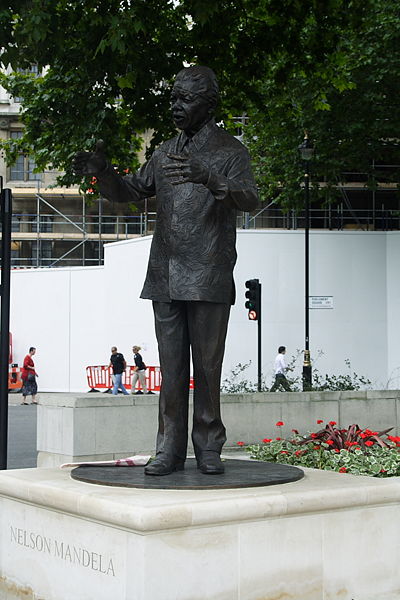|
RHTDM
KALKI is offline
Join Date: Mar 2003
Location: I own a tent, it has a hole in it.
Posts: 47,399
My Mood:

Country 
Star Sign:  |
Retirement
Mandela became the oldest elected President of South Africa when he took office at the age of 77 in 1994. He decided not to stand for a second term as President, and instead retired in 1999, to be succeeded by Thabo Mbeki.
Health
In July 2001 Mandela was diagnosed and treated for prostate cancer. He was treated with a seven week course of radiation.[30] In June 2004, at age 85, Mandela announced that he would be retiring from public life. His health had been declining, and he wanted to enjoy more time with his family. Mandela said that he did not intend to hide away totally from the public, but wanted to be in a position "of calling you to ask whether I would be welcome, rather than being called upon to do things and participate in events.
My appeal therefore is: Don't call me, I will call you". Since 2003, he has appeared in public less often and has been less vocal on topical issues. In his late 80s, he is white haired and walks slowly with the support of a stick.
In 2003 Mandela's death was incorrectly announced by CNN when his pre-written obituary (along with those of several other famous figures) was inadvertently published on CNN's web site due to a fault in password protection. In 2007 a fringe right-wing group distributed hoax emails and SMSs claiming that the authorities had covered up Mandela's death and that white South Africans would be massacred after his funeral. Mandela was on holiday in Mozambique at the time.
The Elders
On 18 July 2007, Nelson Mandela, Graça Machel, and Desmond Tutu convened a group of world leaders in Johannesburg to contribute their wisdom and independent leadership to address the world's toughest problems. Nelson Mandela announced the formation of this new group, The Elders, in a speech he delivered on the occasion of his 89th birthday.
Archbishop Tutu will serve as the Chair of The Elders. The founding members of this group also include Graça Machel, Kofi Annan, Ela Bhatt, Gro Harlem Brundtland, Jimmy Carter, Li Zhaoxing, Mary Robinson and Muhammad Yunus.
“This group can speak freely and boldly, working both publicly and behind the scenes on whatever actions need to be taken,” Mandela commented. “Together we will work to support courage where there is fear, foster agreement where there is conflict, and inspire hope where there is despair.”
AIDS engagement
Since his retirement, one of Mandela's primary commitments has been to the fight against AIDS. In 2003, he had already lent his support to the 46664 AIDS fundraising campaign, named after his prison number. In July 2004, he flew to Bangkok to speak at the XV International AIDS Conference. His son, Makgatho Mandela, died of AIDS on 6 January 2005.
Iraq invasion views
In 2003 Mandela criticised the foreign policy of the George W. Bush administration in a number of speeches. Criticising the lack of UN involvement in the decision to begin the War in Iraq, he said, "It is a tragedy, what is happening, what Bush is doing. But Bush is now undermining the United Nations". Mandela stated he would support action against Iraq only if it is ordered by the UN. Mandela also insinuated that Bush may have been motivated by racism in not following the UN and its secretary-general Kofi Annan on the issue of the war. "Is it because the secretary-general of the United Nations is now a black man? They never did that when secretary-generals were white".
He urged the people of the U.S. to join massive protests against Bush and called on world leaders, especially those with vetoes in the UN Security Council, to oppose him. "What I am condemning is that one power, with a president who has no foresight, who cannot think properly, is now wanting to plunge the world into a holocaust." He attacked the United States for its record on human rights and for dropping atomic bombs on Japan during World War II. "If there is a country that has committed unspeakable atrocities in the world, it is the United States of America. They don't care."
As a member of the United States House of Representatives in 1986, Dick Cheney had voted against a congressional resolution calling for Mandela's release from prison. In 2002, Mandela called Cheney a "dinosaur".
Statues
On 31 March 2004, Sandton Square was renamed Nelson Mandela Square, after a 6-metre statue of Nelson Mandela was installed on the square to honour the famous South African statesman.
On 29 August 2007, a statue of Nelson Mandela was unveiled at Parliament Square in London by Richard Attenborough, Ken Livingston, Wendy Woods, and Gordon Brown. The campaign to erect the statue was started in 2000 by the late Donald Woods, a South African journalist driven into exile because of his anti-apartheid activities. Mandela stated that it represented not just him, but all those who have resisted oppression, especially those in South Africa. He also said, "The history of the struggle in South Africa is rich with the stories of heroes and heroines, some of them leaders, some of them followers. All of them deserve to be remembered."



|